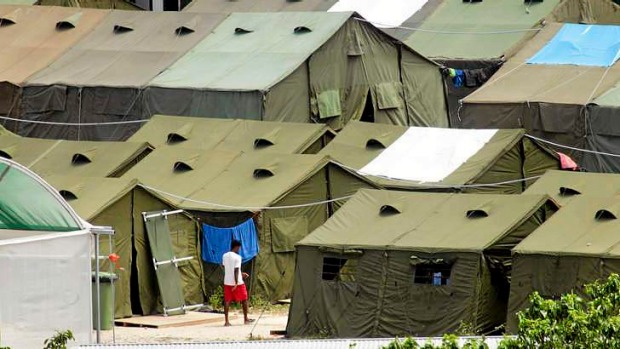In his revolutionary pamphlet, ‘Rights of Man’, Thomas Paine responded to Edmund Burke’s criticism of the Parisian masses. They had razed the Bastille, killed a number of men they suspected of betraying them, put their heads on spikes and paraded them through the city.
Falling short of condemning their actions, Paine argued that they ‘learn[t] it from the governments they live[d] under, and retaliate[d] the punishments they [had] been accustomed to behold’.
This wasn’t merely an effort to reaffirm his support for the people over the despotic king; Paine truly believed the behavior of the masses mirrored that of those who ruled over them. As a member of the National Convention, he voted against the execution of Louis XVI on these grounds. It was a position that put him at odds with the Jacobins and for which he was almost killed.
Last month, revelations made in a Senate inquiry by Transfield Services, the company contracted to run the Nauru detention centre, illustrated how the Australian government’s callousness and immorality on the issue of asylum seekers is beginning to infect the national consciousness.
Transfield reported that there had been 67 allegations of child abuse — 30 against detention centre staff. There has been a further 33 rape and sexual assault allegations and five claims that sexual favours have been sought in exchange for contraband.
These victims are subject to Nauruan law — when Canberra bribed the small Pacific island nation to help solve its asylum seeker ‘crisis’, it abdicated legal responsibility for the refugees.
But Nauru is falling apart. Opposition MPs have been arbitrarily arrested or prevented from returning to the island, magistrates forced to resign and expelled, and the government has clamped down on local media. On top of that, the cost for foreign journalists to obtain a visa has risen from $200 to $8000.
Nauruan President Baron Waqa, who has been embroiled in a corruption scandal with the Australian mining company Gretax, is heading a coup to stamp out his political rivals, take control of the judiciary and silence the media.
But you won’t hear anyone in Canberra calling it a coup because, under international law, aid would have to cease being paid to the regime. And it’s under this guise that Australia pays what amounts to a bribe so that Nauru continues to manage the prison that houses the asylum seekers that were intercepted on their way to our shores.
In 2013–14 Australia’s aid contribution made up approximately 20 per cent of Nauru’s GDP. This year, the contribution will be increased to an estimated $25.9 million. Speaking on ABC Radio National, editor of The Monthly Nick Feik characterised the current situation as being ‘like the Australian government is financially supporting a dictatorship to operate a gulag’.
Where, then, is the moral outrage and indignation? The politicians have an excuse: they have vested interests. If they criticise the Nauruan government they risk undermining their policy of forced indefinite detention and may have to begin treating asylum seekers more humanely.
But what about the rest of us? Has the rape and torture of asylum seekers, many of them children, in institutions established at the behest of Canberra, become so commonplace that it no longer shocks?
It’s not that empathy is an emotion particularly lacking in Australia. The country has shown an ability to empathise en masse when a cricketer or football coach dies. But there remains a disconnect between ‘us’ and asylum seekers.
Could the widespread ambivalence to their suffering be a reflection of various governments’ efforts to demonise asylum seekers? Has Canberra’s willingness to exploit refugees for political gains, undermine their human rights and treat them like criminals been mirrored in the attitudes of the general public?
What does it mean for our society that we’re no longer shocked and outraged by reports that our government is funding a system in which children are regularly sexually assaulted? This is the kind of moral rot Paine warned against.
(This was originally published in Eureka Street on 4th August, 2015.)

